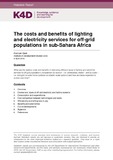| dc.contributor.author | Quak, Evert-jan | |
| dc.date.accessioned | 2018-04-23T13:55:41Z | |
| dc.date.available | 2018-04-23T13:55:41Z | |
| dc.date.issued | 2018-04-09 | |
| dc.identifier.citation | Quak, E. (2018) Lighting and Electricity Services for Off-Grid Populations in sub-Sahara Africa. K4D Helpdesk Report no. 317. Brighton, UK: Institute of Development Studies. | en |
| dc.identifier.uri | https://opendocs.ids.ac.uk/opendocs/handle/20.500.12413/13649 | |
| dc.description.abstract | The current scale of investment of US$15–19 billion per year will still leave 350–600 million people without access to electricity by 2030, who live mainly in rural sub-Sahara Africa. The attention of efforts to achieve the universal access to energy target, therefore, focus on technologies that go beyond the centralised system approach. Evidence from literature shows that grid-based electrification is only an attractive option in densely populated areas, with an expected high demand for electricity, and/or within reasonable distance of existing high voltage power lines. Large parts of sub-Sahara Africa do not satisfy these criteria, with large, sparsely populated rural areas in which many households have a very low income. Thus, the literature shows that population density and electricity demand are important factors for decision-making on the cost-efficiency of off-grid technologies. | en |
| dc.language.iso | en | en |
| dc.publisher | Institute of Development Studies | en |
| dc.relation.ispartofseries | K4D Helpdesk Report; | |
| dc.rights.uri | https://www.nationalarchives.gov.uk/doc/open-government-licence/version/3/ | en |
| dc.subject | Climate Change | en |
| dc.subject | Environment | en |
| dc.title | Lighting and Electricity Services for Off-Grid Populations in sub-Sahara Africa | en |
| dc.type | Other | en |
| dc.rights.holder | DFID | en |
| dcterms.dateAccepted | 2018-04-09 | |
| rioxxterms.funder | Default funder | en |
| rioxxterms.identifier.project | K4D | en |
| rioxxterms.version | NA | en |
| rioxxterms.funder.project | 0986883a-6d0f-4bb8-9c46-5e0682934d65 | en |

